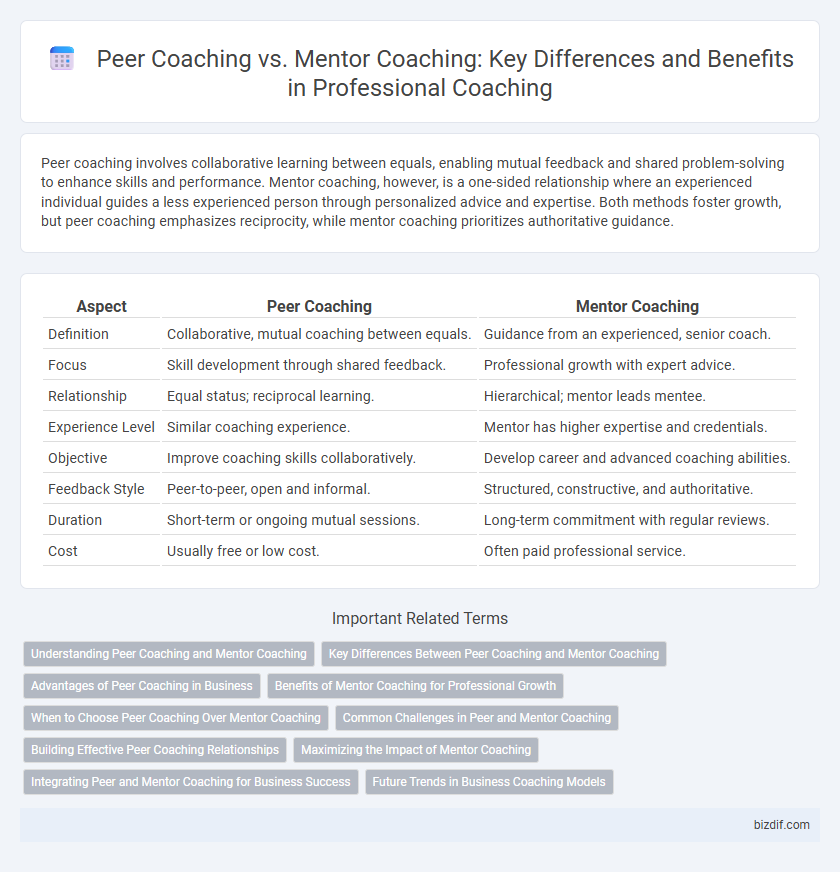Peer coaching involves collaborative learning between equals, enabling mutual feedback and shared problem-solving to enhance skills and performance. Mentor coaching, however, is a one-sided relationship where an experienced individual guides a less experienced person through personalized advice and expertise. Both methods foster growth, but peer coaching emphasizes reciprocity, while mentor coaching prioritizes authoritative guidance.
Table of Comparison
| Aspect | Peer Coaching | Mentor Coaching |
|---|---|---|
| Definition | Collaborative, mutual coaching between equals. | Guidance from an experienced, senior coach. |
| Focus | Skill development through shared feedback. | Professional growth with expert advice. |
| Relationship | Equal status; reciprocal learning. | Hierarchical; mentor leads mentee. |
| Experience Level | Similar coaching experience. | Mentor has higher expertise and credentials. |
| Objective | Improve coaching skills collaboratively. | Develop career and advanced coaching abilities. |
| Feedback Style | Peer-to-peer, open and informal. | Structured, constructive, and authoritative. |
| Duration | Short-term or ongoing mutual sessions. | Long-term commitment with regular reviews. |
| Cost | Usually free or low cost. | Often paid professional service. |
Understanding Peer Coaching and Mentor Coaching
Peer coaching involves colleagues at similar professional levels collaboratively enhancing skills through mutual feedback and shared experiences, fostering a balanced exchange of insights. Mentor coaching, however, engages a more experienced coach providing guidance, expertise, and structured support to accelerate the mentee's development and mastery in coaching competencies. Both approaches optimize professional growth but differ in hierarchy, focus, and the nature of feedback exchanged.
Key Differences Between Peer Coaching and Mentor Coaching
Peer coaching emphasizes collaborative learning and mutual feedback among equals, fostering a supportive environment where both participants share knowledge and develop skills together. Mentor coaching involves a more experienced coach providing guidance, expertise, and personalized feedback to help the mentee enhance specific competencies and achieve professional goals. Key differences include the power dynamics, with mentor coaching being hierarchical and peer coaching being egalitarian, as well as the targeted outcomes, where mentor coaching focuses on mastery and career growth, while peer coaching centers on reciprocal development and problem-solving.
Advantages of Peer Coaching in Business
Peer coaching in business fosters mutual growth by enabling colleagues to share practical insights and real-time feedback, enhancing problem-solving skills and accountability. It promotes a collaborative learning environment that encourages open communication and the exchange of diverse perspectives, leading to innovative solutions and improved team performance. Peer coaching is cost-effective and scalable, making it an ideal approach for organizations aiming to develop leadership capabilities and boost employee engagement without significant investment.
Benefits of Mentor Coaching for Professional Growth
Mentor coaching provides personalized guidance from experienced professionals, accelerating skill development and enhancing coaching competencies. It fosters deeper self-awareness and accountability, enabling coaches to refine techniques and build confidence in real-world scenarios. The structured feedback and industry insights gained through mentor coaching significantly contribute to sustained professional growth and successful certification outcomes.
When to Choose Peer Coaching Over Mentor Coaching
Choose peer coaching over mentor coaching when seeking collaborative learning and equal-level feedback, as it fosters mutual growth without hierarchical constraints. Peer coaching suits situations requiring immediate support and shared problem-solving among colleagues or professionals at similar experience levels. Opt for peer coaching to enhance communication skills and build accountability in a supportive, reciprocal environment.
Common Challenges in Peer and Mentor Coaching
Peer coaching and mentor coaching both face challenges such as unclear role definitions, which can lead to misaligned expectations and hinder progress. Maintaining trust and open communication proves difficult when providing constructive feedback, affecting the coaching relationship's effectiveness. Time constraints and balancing coaching commitments with other responsibilities often impact consistency and the depth of coaching sessions in both approaches.
Building Effective Peer Coaching Relationships
Building effective peer coaching relationships centers on establishing trust, open communication, and mutual accountability to foster collaborative learning. Peer coaching emphasizes reciprocal feedback and shared problem-solving between equals, while mentor coaching involves guidance from a more experienced professional to support skill development. Integrating regular reflection sessions and goal alignment strengthens the partnership, ensuring continuous growth and skill enhancement for both parties.
Maximizing the Impact of Mentor Coaching
Mentor coaching drives deeper skill refinement by offering personalized feedback tailored to the coachee's unique challenges and goals, ensuring continuous professional growth. Unlike peer coaching, mentor coaching leverages extensive experience and advanced expertise to elevate coaching competencies and accelerate mastery. Focusing on targeted development areas through mentor coaching maximizes impact by fostering accountability, insight, and sustained behavioral change.
Integrating Peer and Mentor Coaching for Business Success
Integrating peer coaching and mentor coaching enhances business success by combining collaborative learning with experienced guidance, fostering both innovation and strategic growth. Peer coaching promotes mutual accountability and diverse problem-solving approaches, while mentor coaching provides expert insights and long-term vision essential for leadership development. This synergy accelerates skill acquisition, improves decision-making, and strengthens organizational resilience.
Future Trends in Business Coaching Models
Emerging business coaching models emphasize a shift from traditional mentor coaching to peer coaching, driven by the demand for collaborative learning and shared accountability. Peer coaching fosters a more dynamic exchange of insights between equals, enhancing leadership development and adaptability in fast-changing markets. Advances in digital platforms are facilitating scalable peer coaching networks, supporting continuous growth and real-time feedback within organizations.
Peer Coaching vs Mentor Coaching Infographic

 bizdif.com
bizdif.com